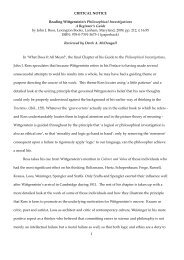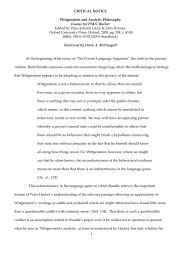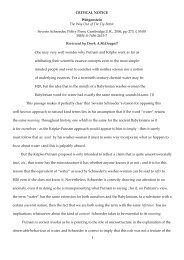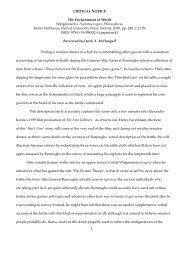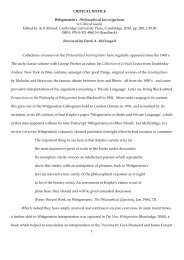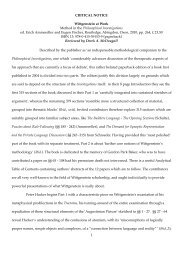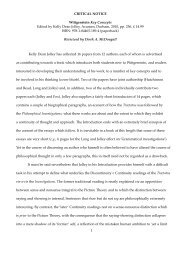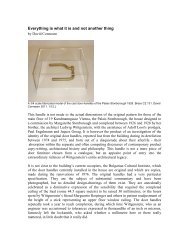The Evolution of the Private Language Argument Aldershot
The Evolution of the Private Language Argument Aldershot
The Evolution of the Private Language Argument Aldershot
You also want an ePaper? Increase the reach of your titles
YUMPU automatically turns print PDFs into web optimized ePapers that Google loves.
But this is simply not true if we adopt <strong>the</strong> assumptions made by those philosophers, Ayer andStrawson, who initially objected to Wittgenstein, for all that <strong>the</strong>y tended to do was argue on <strong>the</strong>(implicit) assumption that since our sensations are intrinsically meaningful to begin with, <strong>the</strong>rewould surely be no difficulty - as Strawson puts it - in claiming that <strong>the</strong> private linguist in <strong>the</strong>course <strong>of</strong> fixing his attention on a sensation in <strong>the</strong> private case ‘might simply be struck by <strong>the</strong>recurrence <strong>of</strong> a certain sensation and get into <strong>the</strong> habit <strong>of</strong> making a certain mark in a differentplace every time it occurred’. (18) That Strawson’s conception <strong>of</strong> a private language is reallythat <strong>of</strong> a language which is in principle public yet used by a solitary individual, is confirmed byhis famously asking in <strong>the</strong> course <strong>of</strong> his discussion - as if this for Wittgenstein could be at allrelevant - whe<strong>the</strong>r we do in practice ever ‘find ourselves misremembering <strong>the</strong> use <strong>of</strong> verysimple words <strong>of</strong> our common language, and having to correct ourselves by attention to o<strong>the</strong>rs’use ?’ (19)<strong>The</strong> same presupposition underlies Ayer’s account, in which his famous RobinsonCrusoe is used to show that a human being raised by wolves in isolation from any normalsocial contact could invent a language for himself, a language which he could eventually teachto Man Friday. Neilsen unusually slips up here, when he takes Ayer to be arguing in favour <strong>of</strong><strong>the</strong> claim that Crusoe’s language ‘could incorporate descriptions <strong>of</strong> sensations which mightturn out to be unintelligible to o<strong>the</strong>r people’, for he uses this to show that Ayer is arguing infavour <strong>of</strong> <strong>the</strong> conclusion that ‘a contingently private language was possible, and that <strong>the</strong>possibility <strong>of</strong> a contingently private language implied <strong>the</strong> possibility <strong>of</strong> a necessarily privatelanguage. Wittgenstein was mistaken.’ (20) But Ayer nowhere endorses <strong>the</strong> possibility <strong>of</strong> alanguage which is necessarily private: all he does is suggest that where Crusoe’s sensationshave no ‘natural expressions’ he may fail to find any way <strong>of</strong> teaching Friday <strong>the</strong> use <strong>of</strong> <strong>the</strong>words to stand for <strong>the</strong>m, which he follows with <strong>the</strong> claim that this does not at all mean that -presumably when <strong>the</strong> sensations do have natural expressions - Man Friday will be incapable11



